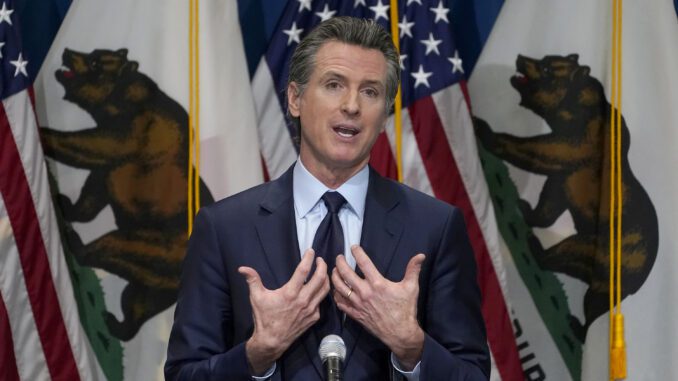
Will Gov. Gavin Newsom be the second Democratic California governor to be recalled and removed from office in this (or the last) century? Polls suggest that’s one possible result of next month’s recall election.
If so, it would be a startling result. We have just seen the second consecutive Democrat elected governor of heavily Democratic (61% President Joe Biden) New York, in both cases for alleged sexual misconduct. It would be more politically significant for a second consecutive Democrat elected governor of even more heavily Democratic (63% Biden) California get the boot for policy reasons.
Gray Davis, the governor who was recalled in 2003, had entered office determined to hold in check the hyperliberal, heavily Democratic legislature. But overspending got through anyway, and he backed driver’s licenses for illegal immigrants. Also, he was hurt by electricity blackouts caused by a botched deregulation system he had no part in creating.
Newsom’s problems have a similar ring. He was elected in 2018 with 62% of the vote, the strongest showing since Earl Warren won his third term with 65% in 1950. Polls last spring showed just 36-40% favoring recall, much like the 2018 result. But the most recent three polls this summer show 46-51% favoring recall. Given that some Republican voters refuse to be polled, as the American Association for Public Opinion Research report on 2020 polling errors concluded, Newsom seems to be in the same kind of trouble as Davis was.
Why the switch? SurveyUSA polls showed Latinos, one-quarter of the electorate, moving from opposing to backing recall. Berkeley polls show a similar trend among Latinos and Asians. The most recent Emerson poll shows Latinos favoring recall by a 54-41% margin. On contrast, the exit poll showed 64% for Newsom in 2018.
Subgroup analysis is risky because of high margins of error. But as Auric Goldfinger told James Bond, “Once is happenstance. Twice is coincidence. The third time is enemy action.” Similar trends in three different polls looks like something real.
This movement against liberal policies makes sense once you realize that even low-income voters are less interested in economic redistribution than in the maintenance of order. Newsom, in a testy interview with McClatchy newspapers, boasts of the state’s large earned income tax credit, but his lockdown policies have kept California’s unemployment rate at 7.7%, higher than all but three other states. (Texas is at 6.6%, Florida at 5.0%).
The income and wealth gaps in California, much greater than in most other states, were symbolized when Newsom broke his own rules and dined maskless indoors with lobbyists at the Michelin three-star restaurant French Laundry last November.
Against this background of the well-connected rich — Newsom’s core constituency is San Francisco Bay-area big contributors — consider other results of California’s liberal policies. Some have resulted in visible disasters, like wildfires and electricity blackouts, while others — high housing prices and utility rates — loom large for modest-income households while easily brushed off by the rich.
Homeless men by the thousands live under freeway overpasses or in stretches of Venice beachfront, despite (actually, because of) multimillion dollar homeless programs. Thugs run through the aisles of chain drug stores filling their bags with goods they haul out, under security guards’ eyes, to waiting cars — the result of California voters’ lunatic approval of reclassifying thefts under $950 as misdemeanors, not felonies.
California has not been immune either from the unprecedented — at least since statistics started being collected in 1960 — rise in homicides and other violent crimes. In response, Los Angeles partially defunded the police, and radical district attorneys elected in Los Angeles and San Francisco Counties have declined to prosecute thousands of cases.
California’s Latinos, mostly the product of a 1982-2007 surge of migration from Mexico, may be responding to this disorder as California’s white homeowners, mostly the product of a 1940-65 surge of migration from the Midwest, responded to the disorder of the Watts riots and Berkeley rebellions of the 1960s. The voters who had supported the liberal policies of Democratic Gov. Pat Brown switched in large numbers in 1966 to the conservative former Midwesterner Ronald Reagan.
There’s no Reagan on the scene, unless it’s radio talk host Larry Elder, who seems ahead in the race to succeed Newsom if he’s recalled. It’s entirely possible that Newsom will be able to rally enough Democrats to stay in office. But his current ads attacking former President Donald Trump don’t seem more effective than 1966 attempts to claim Reagan was another Barry Goldwater.
Lesson: The first duty of government is to provide a stable order in which people can live their lives. California’s liberal Democrats seem to be flunking.
Michael Barone is a senior political analyst for the Washington Examiner, resident fellow at the American Enterprise Institute and longtime co-author of The Almanac of American Politics.


